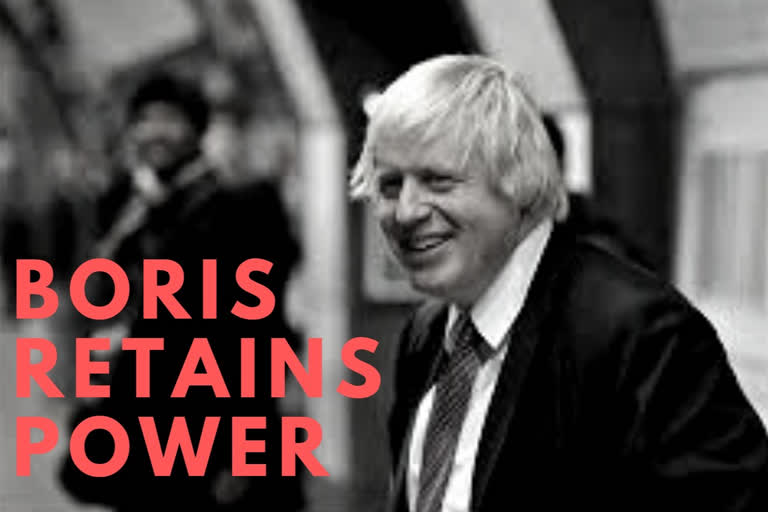Hyderabad: Brexit is now a reality, never mind its consequences. Boris Johnson, who has been its face all along, on Friday, won a famous victory on the heady slogan of 'Get Brexit Done.’
He was appointed Prime Minister after Theresa May bowed out in July, but on Friday he led the Conservatives to their biggest win since Margaret Thatcher’s third electoral triumph as Prime Minister in 1987.
Voters, weary of over three years of recriminations and delays over Brexit, since the referendum in 2016, settled for Johnson who promised to leave European Union beginning end-January.
Though he made several promises, such as 14 new multi-specialty hospitals, 20,000 more policemen, 50,000 more nurses, more funds for sickly NHS, etc., it was his theme song of `get Brexit done’ which resonated the most with voters. The Conservatives now have a comfortable majority of 78 in a House of 650.
The main Opposition , the Labour Party, suffered huge losses. Jeremy Corbyn was probably the most unpopular Labour leader in half- a- century, dividing the top echelons of the party on ideological grounds while firming up his support among the party base spouting hard left policies.
In the twenty-first century, there were few takers for his assault on the free market system, promise to re-nationalize wide swathes of public and private industries and services, his latent anti-Semitism, anti-American and pro-Russia tilt in foreign policy, etc.
In one word, he was a throwback to the Cold War era while the world had moved on. Corbyn’s Labour dropped 59 seats, winning only 203. The long-time Labour bastions switched to Tories due to Corbyn’s confused stand on Brexit.
While he himself claimed to be neutral, he promised to hold yet another referendum on Brexit should voters put him in power, little realizing that the hard-core Labour supporters were in the forefront of the Brexit campaign.
The white British working class male feeling left out in the economic sweepstakes and deeply resenting the influx of cheap labour from the erstwhile Soviet Bloc countries which had since joined the EU rooted for Brexit while Corbyn’s Labour remained ambivalent on the issue. Small wonder in its traditional strongholds the Tories won seats they had not won in more than half a century.
On the other hand, strong Remain constituencies in London shunned Labour because of retrograde Labour policies. It was, thus, a win-win situation for Johnson. Yet, Corbyn wouldn’t resign immediately owning responsibility for the worst loss in years, saying the party had to go through a process which can be completed only next year.
On the other hand, the leader of the Liberal-Democrats, Jo Swinson, who fared badly in the poll, herself failing to retain her seat, lost no time in submitting her resignation.
However, breaking the country-wide trend was Scotland where the Scottish National Party under Nicola Sturgeon won 48 seats, 13 more than last time. Immediately the demand for a second referendum for Scotland to decide whether to remain in the UK or become independent was raised, with Sturgeon categorically stating that the big win was for a second referendum. Scotland had voted solidly for Remain in the 2016 referendum. It will find it odd if Britain left the EU, as it would, at the end of January next year.
A newly-empowered Johnson realizing the strong current for independence in Scotland has already taken to emphasizing that his mandate was for `One Britain,’ for national unity.
As it is, after leaving the EU on 31st January, a tough road lies ahead for Britain. Whether the EU will grant a fair trade deal to UK, which thumbed its nose at the 27-member Union, remains to be seen. In any case, trade agreements can take years and might not meet Johnson’s pressing schedule. Given that he suffers from a trust deficit, his bluff of signing trade agreements with the US, India and a host of other countries might not take long to be called out.
The chaos of Brexit can have a destabilizing impact on large parts of British business and industry, regardless of the pound sterling strengthening in the wake of the big Tory win. Britain too is a dwindling power now and would need strong trading partners to boost economic growth. In the last quarter its growth rate was zero. Johnson can no longer hope to run Britain with his swashbuckling, boisterous style.
He will have to show that he is capable of hard work and can carry all sections within his party and outside with him as he navigates the tough months and years ahead in quest of fair and productive trade deals with the EU, the US, India, etc.



